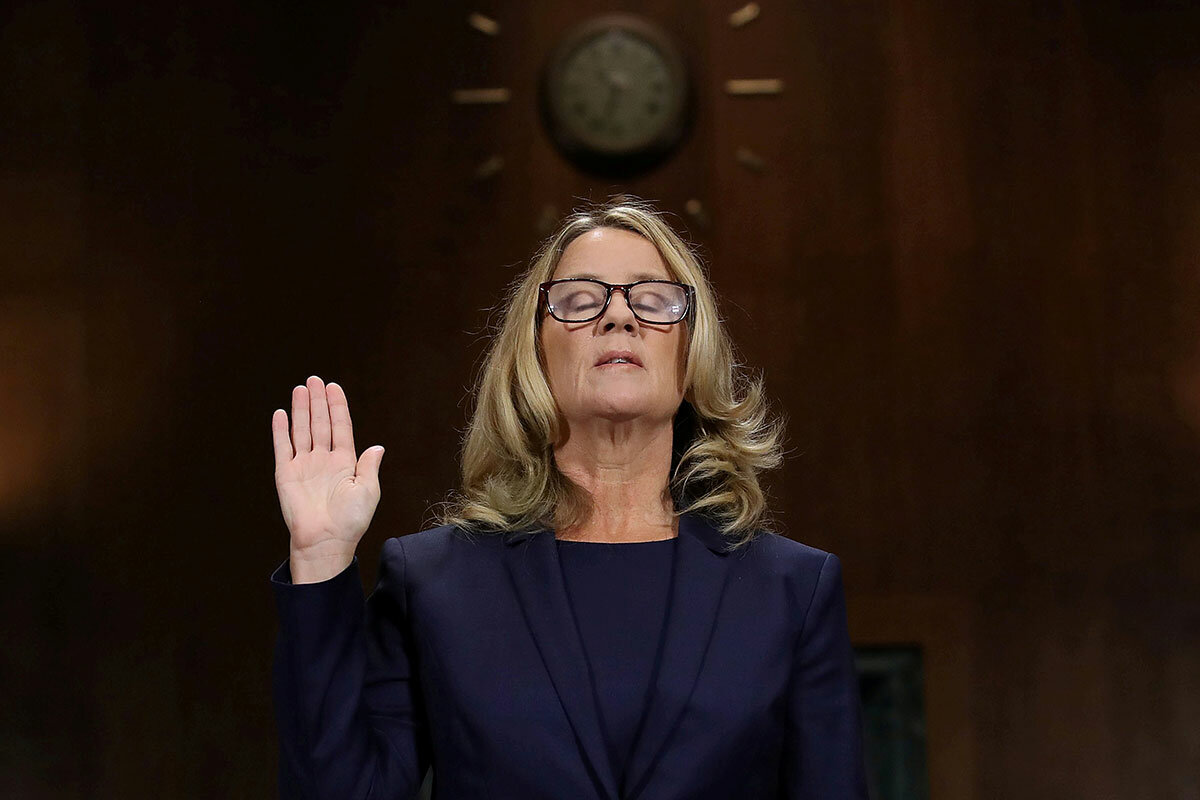The legacy of 'boys will be boys' on American life
Loading...
| New York
It’s a cultural ambivalence that comes with a ready-made list of clichés: “Boys will be boys,” they need time to “sow their wild oats.” If teens and men in their early 20s are loud, loutish, and sexually aggressive, the argument goes, much of it can be chalked up to “youthful indiscretions.” Those were only “indiscretions” from the perspective of the young men perpetrating them – not the young women who experienced them as “humiliating” and “shameful,” says ethicist Celia Fisher. Historians trace the sexual double standard to Victorian times, when women were expected to uphold the pillars of moral virtue. By the early 20th century, industrialism and urban living evoked a crisis in masculinity. Ideals of restraint gave way to the celebration of a more reckless masculinity. Today, it can be seen in a “locker room” culture in which young men are encouraged to establish their place in the masculine hierarchy. But that double standard doesn’t just demean one gender, says Maggie Seymour, a former intelligence officer. “It’s also incredibly insulting to men. I firmly believe men are capable of understanding human emotions and interactions and controlling their impulses.”
Why We Wrote This
Allegations of sexual misconduct against an individual have – over and over during the past year – led to questioning a culture in which many Americans believe young men need a time of wildness and aggression in order to grow into strong leaders.
When it comes to the proper behavior of its young men, American society has long maintained a not-so-subtle ambivalence about the way boys are supposed to grow up and develop into men.
Perhaps since the Victorian era, beneath the surface of accepted social values that would uphold a sober-minded code of behavior for its young men, many Americans also maintain a certain belief that the next generation of strong, masculine leaders need a time to explore their own testosterone and often alcohol-fueled wildness and aggression.
It’s an ambivalence that comes with a ready-made list of clichés: “Boys will be boys,” boys need time to “sow their wild oats,” and, as expressed more recently, boys should have a private “locker room culture.” And if many men in their formative teens and early 20s are loud, loutish, and sexually aggressive, the argument goes, much of it can be chalked up to “youthful indiscretions.”
Why We Wrote This
Allegations of sexual misconduct against an individual have – over and over during the past year – led to questioning a culture in which many Americans believe young men need a time of wildness and aggression in order to grow into strong leaders.
As the FBI investigates this week allegations that Supreme Court nominee Brett Kavanaugh sexually assaulted and exposed himself to young women when he was of this formative age more than 30 years ago, many women have begun to zero in specifically on this cultural ambivalence, and the long-held double standard that often holds women to a very different code of behavior.
“It’s this kind of socialization that can make young men treat women in a similar way when they get older,” says Celia Fisher, an ethicist at Fordham University in New York. “And it’s really emblematic of gender power inequities, because for any girl experiencing this culture, ‘youthful indiscretions’ are only defined by the men in power and the boys in power.”
“They were never considered ‘youthful indiscretions’ by the women who were the victims of this behavior, they were considered shameful and traumatizing,” Professor Fisher continues. “And while these become ‘youthful indiscretions’ for males, women were labeled as a tramp or a whore or whatever else the language was at that time.”
Women have battled such male privilege and the double standards used against them for well over a century, historians say, beginning with the launch of the suffrage movement. In the early 20th century, women led the effort to bring a constitutional prohibition against alcohol, arguing that women suffered from the substance being widely abused by men. Later, Anita Hill’s accusations of sexual harassment riveted the nation during the confirmation hearings of Clarence Thomas in 1991, leading to “The Year of the Woman” and the election of a then-historic number women a year later.
For many women, however, the #MeToo era has ushered in a deeper shift in values simply because of the fact that women have embraced the moral power of their stories of abuse.
“There seems to have been a real shift,” says Kristin Kobes Du Mez, a professor of history and gender studies at Calvin College in Grand Rapids, Mich. “What was once silent and in the shadows and surrounded by fear – people are not keeping silent anymore.”
“As they said at the hearing, bravery is contagious,” says Professor Du Mez. “And I think there’s some real truth that is resonating with the women that I’m talking with, and it’s resonating with me. That is, if you see one woman put herself out there, you support her and you realize that you’ve got stories to tell as well, and might be emboldened to do so now.”
Du Mez has traced the shifting ideals of masculinity, and she notes how the sexual double standard really began to take cultural shape during the Victorian period, when women were presumed to be the protectors of moral virtue, both for themselves and society. And while men were considered to be virtue challenged, they were also expected to exercise a gentlemanly restraint.
By the early 20th century, however, industrialism and urban living evoked a crisis in masculinity. Ideals of restraint gave way to the celebration of a more reckless masculinity. The closing of the frontier led to the myth of the cowboy and his isolated, idealized way of life. Images of Native Americans and Tarzan began to emerge as masculine ideals.
“But you also have in American psychology at this point the development of academic theories to support this,” says Du Mez. “There was the fear that in the 20th century, men, especially white middle class and upper class men, might not be masculine enough anymore. Who exemplifies this rugged masculinity? And they realize that it’s not them.”
“And so that’s where they come up with that developmental model, where boys will be boys, that boys need to sow their wild oats, that they need to go through a ‘savage stage’ of development, like Tarzan did. And after they experience that developmental stage in its fullness, then they will grow up, then they can develop some restraint, after somehow preserving this core of masculinity that otherwise seemed lacking.”
Today, it’s a culture in which young men are in many ways encouraged to establish their place in the masculine hierarchy. It includes locker room roughhousing and aggression, boasts of sexual “scoring,” and the use of humiliating slurs invoking the image of women or effeminate men.
“The fact that this kind of talk is so prevalent isn’t a defense. It’s an indictment,” says Maggie Seymour, who deployed to Afghanistan and Iraq as an intelligence officer. She has seen the “boys will be boys” attitude fermenting on both military bases and college campuses. “...This sort of defense not only allows sexual assault but encourages it by setting the bar so low.”
And excusing vulgar comments about women demeans another gender, she adds.
“It’s also incredibly insulting to men,” Ms. Seymour says. “I firmly believe men are capable of understanding human emotions and interactions and controlling their impulses.”
David Rullo, a lawyer and former police officer who lives in Verona, N.J., took part in the invasion of Iraq when he was in the Marine Corps. He recalls the lack of respect that men in the military displayed toward women in uniform. “It makes me incredibly sad that all of this behavior was going on and we didn’t know how wrong it was.”
“We should have known,” says Mr. Rullo. “And I think that the silence from a lot of the men comes from injured pride. People don’t want to say, ‘We screwed up. We were wrong.’ ”
Indeed, the vulnerable testimony of Christine Blasey Ford on Thursday contrasted sharply with the angry and partisan testimony of Judge Kavanaugh. President Trump and many Republicans welcomed his aggressiveness as justified righteous indignation, even while expressing sympathy with Dr. Blasey Ford, whom they believe must have been assaulted by someone else in the past.
Still, for many observers, Kavanaugh’s testimony laid bare the kind of “boys will be boys” ambivalence especially among the nation’s ruling elites. “I like beer” became a kind of leitmotif of the Supreme Court nominee’s testimony, and his pored-over high school yearbook contained references to his membership in the “Keg City Club” and frequent vomiting.
Many are also questioning the judge’s characterizations of well-known sexual innuendos. He and eight other football players described themselves as “Renate Alumni,” horrifying the woman in question, who only learned of the yearbook inscription last week. “[The] insinuation is horrible, hurtful and simply untrue,” Renate Dolphin told The New York Times. “I pray their daughters are never treated this way.”
Kavanaugh and other former students denied that this was a boast of sexual conquest, however. “That yearbook reference was clumsily intended to show affection, and that she was one of us,” he testified, saying they admired her and merely referred to the fact that each went to dances with her or shared a kiss.
“My professional opinion is, is that the majority of men do not do this, we know that,” says Fisher, the ethicist at Fordham. “The majority of adolescents and teens do not assault young women.”
“So there is a character trait that allows for this kind of behavior,” she continues. “And I think that’s the issue that’s coming to the fore. Whether it was 30 years ago or 40 years ago, what kind of foundational character traits are underlying a person who would mock or traumatize women, who would be violent with women, or would exert power in a physical way?”
Monitor correspondent Martin Kuz contributed to this report from Sacramento, Calif.










